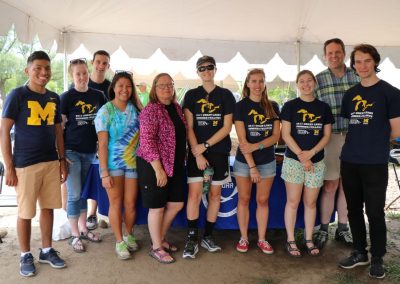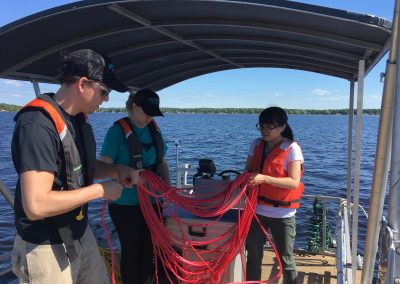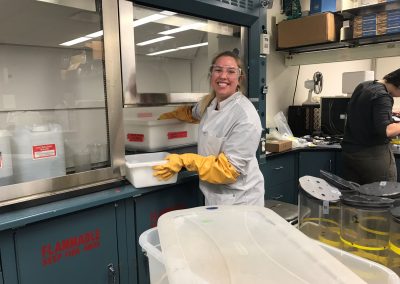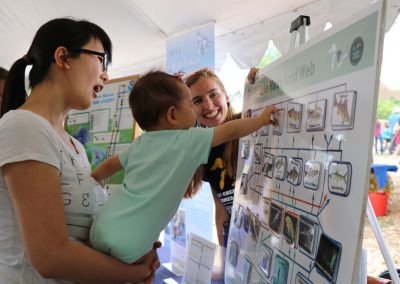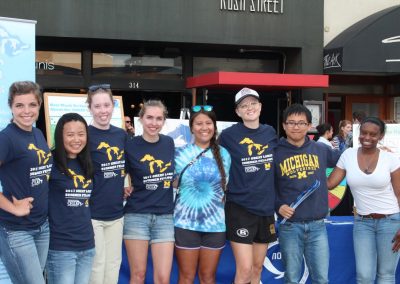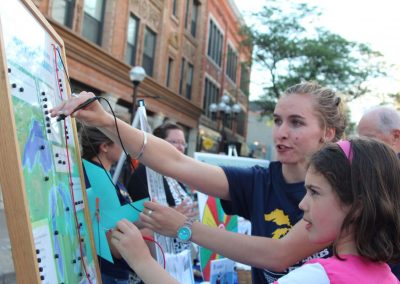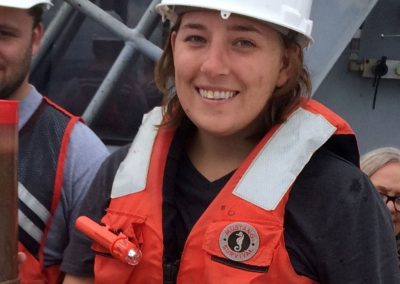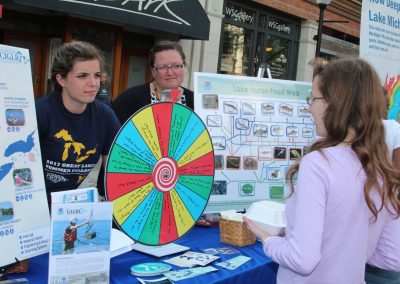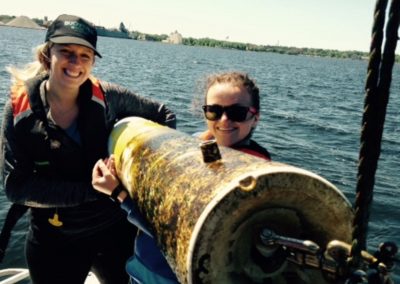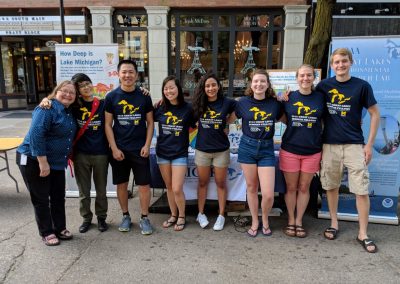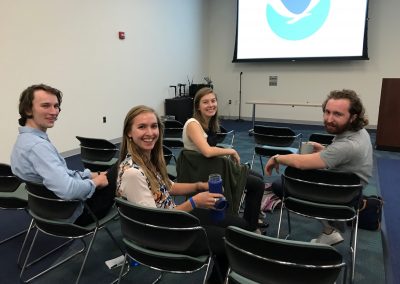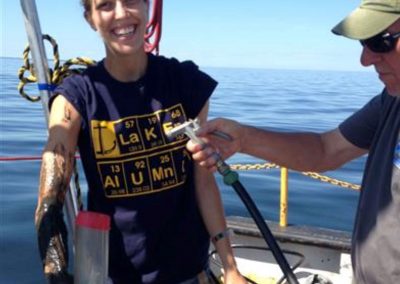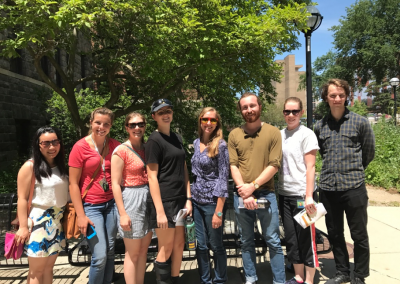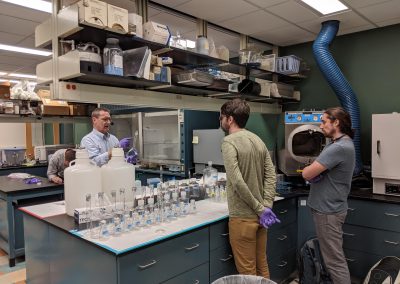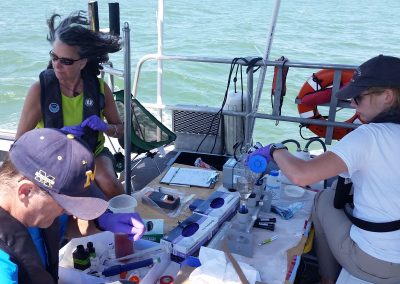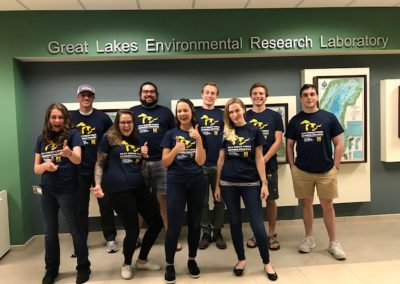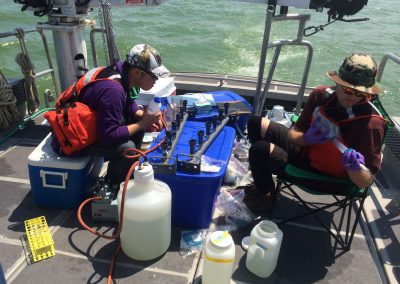Career Training
Building a skilled workforce to become the next generation of Great Lakes scientists
A workforce prepared to take on the greatest challenges facing our natural environment cannot be developed solely in the classroom. Hands-on, experiential training opportunities using the latest technologies and techniques are essential for skilled workforce development. CIGLR provides NOAA-mission related research experience to undergraduates, graduate students, and postdoctoral research fellows who work closely with NOAA, CIGLR, and Regional Consortium scientists. Our trainees are mentored in complex research projects and professional development activities that prepare them to become the next generation of leaders in Great Lakes and NOAA science.
Find out more about CIGLR’s career training program:
Student & Postdoc Opportunities
Media
News
- Water Quality Modeling in the Great Lakes, Fall 2020 eNews, 12/2020
- 2020 Great Lakes Summer Fellow Video Series, Fall 2020 eNews, 12/2020
- Synthesizing the Great Lakes Restoration Initiative’s Funding Efforts, Summer 2020 eNews, 09/2020
- Do Zooplankton Fuel Harmful Algal Blooms?: Understanding Zooplankton-Mediated Nutrient Recycling in Lake Erie, Spring 2020 eNews, 06/2020
- 2020 Great Lakes Summer Fellows go Virtual!, Spring 2020 eNews, 06/2020
- Using Environmental DNA and RNA to Inform Biomonitoring and Bioassessment Management Plans, Fall 2019 eNews, 12/2019
- 2019 Great Lakes Summer Fellow Video Series, Fall 2019 eNews, 12/2019
- What Determines Public Support for Water Quality Regulations to Mitigate Agricultural Runoff?, Summer 2019 eNews, 09/2019
- University of Michigan Master’s Students Work to Improve Harmful Algal Bloom Forecasts in Saginaw Bay, Lake Huron and Western Lake Erie, Summer 2019 eNews, 09/2019
- Outreach and Communications Update: Reaching the Next Generation of Great Lakes Scientists, Spring 2019 eNews, 06/2019
- Using Historical Data and Statistical Models to Better Understand Lake Erie Harmful Algal Blooms, Winter 2019 eNews, 03/2019
- How Many Fish are in the Great Lakes? Using Microscopic Organisms to Estimate Fish Numbers, Winter 2019 eNews, 03/2019
- Harmful Algal Blooms in Lake Superior, Fall 2018 eNews, 12/2018
- Phosphorus Reduction in Lake Erie: The Solution to Harmful Algal Blooms?, Summer 2018 eNews, 09/2018
- Using Satellite Data to Improve Great Lakes Monitoring and Forecasting, Summer 2018 eNews, 09/2018
- Carbon Cycling in a Great Lake’s Estuary – Muskegon Lake, Spring 2018 eNews, 06/2018
- Welcome 2018 Great Lakes Summer Fellows!, Spring 2018 eNews, 06/2018
- Tackling the HAB Problem in Green Bay, Lake Michigan, Summer 2017 eNews, 09/2017
- Understanding Muskegon Lake – a Great Lakes Estuary under Stress, Summer 2017 eNews, 09/2017
- New CILER Graduate Fellows Take On Key Challenges in the Great Lakes, Winter 2017 eNews, 03/2017
- Understanding Green Bay Hypoxia Through Novel and Traditional Biogeochemical Techniques, Winter 2017 eNews, 03/2017
Career Training Photo Gallery
CIGLR, GLOS, and NOAA GLERL summer fellows interns scientists and staff celebrate 2017 Huron River Day together by sharing their knowledge on Great Lakes environmental research. Photo Credit: NOAA GLERL.
Tony Weinke (AWRI technician), Katie Knapp (CIGLR graduate fellow) and Qianqian Liu (CIGLR Post-doctoral Associate) prepare mooring ropes for deploying instruments on Muskegon Lake. Photo Credit: GVSU.
University of Michigan School for Environment and Sustainability graduate student, Mikayla Baer, washing equipment in an acid bath. Photo Credit: Michele Wensman.
2017 CIGLR Great Lakes Summer Fellow Verena Lucke (Indiana University) plays a Lake Huron food web game with one of our youngest Great Lakes enthusiasts. Photo Credit: NOAA GLERL.
CIGLR and GLERL 2017 Summer Fellows at the 2017 Ann Arbor Mayors Green Fair. CIGLR’s Great Lakes Summer Fellows participate in the summer education and outreach events as part of the program’s career training element. Photo Credit: Katherine Glassner-Shwayder.
2017 CIGLR Great Lakes Summer Fellow, Verena Lucke (Indiana University), quizzes a young Great Lakes enthusiast using an interactive map. Photo Credit: Katherine Glassner-Shwayder.
Kaitlin Reinl is a first year Ph.D. student at the University of Minnesota-Duluth, advised by Dr. Robert Sterner and co-mentored by Dr. Tom Johengen (CIGLR). The goal of her fellowship research is to evaluate algal bloom response time to changes in temperature and nutrients in three different ecosystems. Photo Credit: University of Minnesota – Duluth.
2017 CIGLR Great Lakes Summer Fellow Kennedy Connolly and Communications Specialist Aubrey Lashaway play Great Lakes Trivia with an inquisitive student. Photo Credit: Katherine Glassner-Shwayder.
Katie Knapp (CIGLR graduate fellow) and Rachel Ratliff (AWRI technician) pull one of the 3 spar buoys with sensor strings that serve to monitor water quality in the different sub-basins of Muskegon Lake. Photo Credit: GVSU.
Ann Arbor, MI Mayor’s Green Fair, downtown on Main Street!! We had a fun crew that loved talking about our amazing #GreatLakes! #GreatLakesSci #Outreach #SciComm #ScienceForSociety Photo Credit: Aubrey Lashaway.
Summer fellows waiting to present their final research projects. Pictured L-R: Kylan, Verena, Angelika and Tom. Photo Credit: Michele Wensman.
Shelby LaBuhn was a CIGLR Graduate Research Fellowship recipient (2015-2016) prior to completing her Ph.D. at the University of Wisconsin-Milwaukee’s School of Freshwater Sciences (UWM-SFS). This fellowship provided several opportunities for Shelby to collaborate with her co-mentors Drs. Ashley Elgin (NOAA GLERL) and Tom Johengen (CIGLR) on hypoxia-focused projects. Photo Credit: University of Wisconsin-Milwaukee.
CIGLR Summer Fellows ready for their University of Michigan Lab tours. L-R: Huayun, Kennedy, Angelika, Rae, Verena, Tom, Chelsea and Kylan. Photo Credit: Michele Wensman.
2019 Graduate Research Fellows from the University of Michigan School for Environment and Sustainability, Seamus Harrison and Charlie Ramsey, preparing an experiment with mentors Tom Johengen and Casey Godwin studying harmful algae blooms in the Great Lakes. Photo Credit: Michele Wensman.
Dr. Thomas Johengen, Heidi Purcell and Deanna Fyffe collecting Lake Erie water samples and filtering the samples in the field. Photo Credit: NOAA GLERL.

